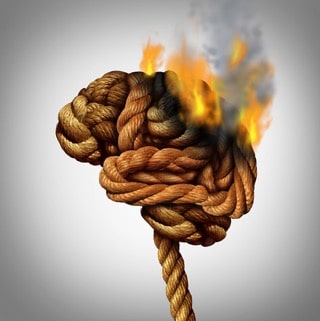Concussions triple suicide risk
 While concussions have gained attention for their link to dementia, did you know they also increase the risk for suicide? Just one concussion can triple the long-term risk of suicide in otherwise healthy people.
While concussions have gained attention for their link to dementia, did you know they also increase the risk for suicide? Just one concussion can triple the long-term risk of suicide in otherwise healthy people.
Although brain-injured football players have been receiving all the attention lately, the typical concussion patient is a middle-aged adult. Most concussions happen during traffic accidents, falls at home, and in other everyday situations.
A study looked at a quarter-million subjects who had been diagnosed with a mild concussion during the last 20 years. Researchers found suicide occurred at three times the norm in this population. They also found that on average suicide occurred nearly six years after the concussion. Also, the risk increased with additional concussions.
WHY DOES A CONCUSSION INCREASE SUICIDE RISK?
In functional medicine we know a concussion causes brain inflammation, from which the patient may never fully recover. Unlike the body’s immune system, the brain’s immune system does not shut off once triggered. As a result, unchecked brain inflammation damages and destroys healthy brain cells.
Brain inflammation is tied to various brain-based disorders, including depression and mental illness. In fact, a 2014 study concluded that sustaining a head injury leads to a greater risk of mental illness later in life.
When patients fail to employ strategies to dampen brain inflammation, post-concussive inflammation continues its crawl through the brain like a slow-burning fire, consuming neurons in its path. This can go on for years after the concussion, impacting mood, memory, and general function.
What’s more, thanks to intimate communication between the brain and the gut, a concussion often impacts gut health and function. Many people report the onset of digestive issues after a concussion.
This is bad news because research shows an inflamed and unhealthy gut is directly linked to depression, giving post-concussive patients a double whammy of depression-inducing inflammation that travels back and forth between the gut and the brain.
FUNCTIONAL MEDICINE STRATEGIES FOR CONCUSSIONS
For every person who dies from suicide, many others think about it or suffer from chronic depression.
This study shows a clear need for better long-term care of patients with concussion.
Fortunately, functional medicine offers many strategies to reduce brain inflammation and lower the risk of mood disorders such as depression after a concussion:
- Stabilizing blood sugar
- Removing inflammatory triggers from the diet (such as gluten) or the environment (such as synthetic scents or toxic cleaning products)
- Improving gut health and gut bacteria diversity
- Identifying and addressing autoimmune diseases, situations where the body’s immune system attacks body tissue, creating chronic inflammation. Autoimmune reactions in the brain are more common than people realize.
- Addressing chronic infections.
- Improving blood flow and oxygenation flow in the brain.
- Stabilizing hormones.
- Using nutritional compounds to reduce inflammation in the brain.
- These are among the foundations of functional medicine that can make the difference between a post-concussive downward spiral or be the springboard to a more brain-healthy way of living.
If life hasn’t been the same since your concussion, ask my office how functional medicine strategies can help.
